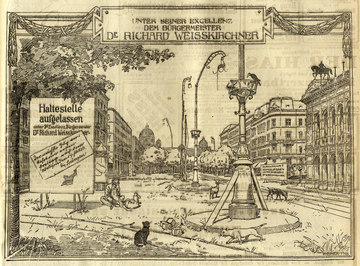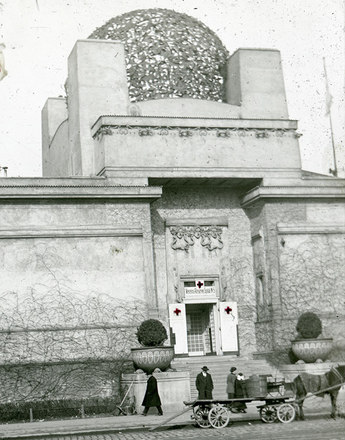‘Long jackets instead of Tailcoats’ – The Music Business in Times of Austerity
In the summer of 1914 there was a temporary cessation of performances at the Burgtheater and the Court Opera in Vienna, in the latter case on the basis of the argument that music should be silent while there was the noise of weapons. Hans Gregor, the director of the Court Opera, tried to intervene against the closure of his theatre, expressing the opinion that it was precisely in such difficult times that the people needed some form of diversion. The two theatres opened again in mid-October 1914, the Court Opera with a performance of Lohengrin, traditionally the first performance of the season.
However, the two theatres had to make concessions to the requirements of wartime, including more days when there was no performance than before the war and considerably reduced ticket prices. The Vienna daily Neue Freie Presse reported that people were taking a lively interest in both theatres and that there were ‘such crowds at the box offices that the security guards had to intervene’. At the same time German theatres were complaining of a lack of interest on the part of the public: ‘The theatres are not doing well. Many of them are staging performances, but in front of scantily occupied stalls and empty boxes.’
The war led to a reduction in the number of performances. In the 1914-15 season Gregor reported: ‘The following have been called up: the solo singers Franz Markhoff, Viktor Madin, Julius Betetto, Michael Nasta, Artur Preuss (the last three were later allowed back on leave). In addition 38 members of the orchestra, 14 members of the choir, 15 ballet dancers, 7 stage musicians, 59 stage hands, 16 tailors or dressers, etc., etc.’ In order to be able to keep staging performances towards the end of the war prisoners of war with a knowledge of German were requested for a number of tasks – a practice which had been usual in Germany for some time, but which had earlier been strictly rejected in Vienna.
The theatres suffered not only from a lack of staff but also from an acute shortage of material, which naturally affected the décor and costumes used in productions. In the course of the war increasing prices fuelled by inflation made it more and more difficult to maintain performances. All this had an impact on the choice of repertoire. A recommendation made by the Association of German Theatres in Berlin that Mozart’s Don Giovanni should only be performed in one particular version was intended to ensure that those guest singers who were still available could take over roles more easily when required. A revised version of the libretto of The Magic Flute by the Salzburg author Leo Maasfeld was intended to result in economies: ‘By providing a certain sequence of transformations – with the curtain left up – I have managed to reduce the opera to four acts, that is to say curtains, so that this magnificent opera is given a unified form from a musical point of view.’
The war also had other effects on the theatres and opera houses: for example the times of the evening performances had to be brought forward in order to ensure that patrons could get home afterwards. Some horse-drawn carriages could not operate because of a lack of fodder. At the end of 1915 the reinstatement of some municipal tram services meant that it was again possible to get home later, but only until the beginning of 1917, because a shortage of coal to generate electricity led to the last trams leaving the Ringstrasse in the city centre as early as 8.30 p.m. And finally the Vienna Philharmonic Orchestra decided to save money by replacing the tailcoats they wore with long jackets that were less elegant but cheaper to produce – a measure that was also seen as an outward sign of the orchestra turning away from its exclusive image.
The Court Opera was no exception, and other theatres also had to do without some ensemble and staff members, as well as to offer tickets at considerably reduced prices. Towards the end of the war, as the economic situation became increasingly precarious, concert halls were subject to phased closures, which led the music writer Ludwig Karpath to diagnose a ‘disruption of his spiritual balance’ after eight days without a concert in Vienna.
Translation: Leigh Bailey
Peitzmeier, Jens: Das musikalische Kunstwerk als Patriot und Feind. Instrumentalisierung der Musik im Ersten Weltkrieg. Masterarbeit Osnabrück 2012
Regler, Liselotte: Hans Gregor – Die Ära des letzten Hofoperndirektors in Wien. Dissertation Wien 2010, unter: http://othes.univie.ac.at/10107/1/2010-05-10_9008228.pdf (20.06.2014)
Trümpi, Fritz: Politisierte Orchester, Wien 2011
Quotes:
„crowds at the box offices ...": Neue Freie Presse vom 19.10.1914, 8 (Translation)
„The theatres are not doing well ...": Der Merker Nr. 116 (5. Jg.) vom 02.10.1914, 536, zitiert nach Peitzmeier, Jens: Das musikalische Kunstwerk als Patriot und Feind. Instrumentalisierung der Musik im Ersten Weltkrieg. Masterarbeit Osnabrück 2012 (Translation)
„The following have been called up ...": Dokumente Staatsarchiv, Karton Oper 305/15, Zl: 555, zitiert nach: Regler, Liselotte: Hans Gregor – Die Ära des letzten Hofoperndirektors in Wien. Dissertation Wien 2010, unter: http://othes.univie.ac.at/10107/1/2010-05-10_9008228.pdf (20.06.2014), 137f. (Translation)
„By providing a certain sequence ...": Dokumente Staatsarchiv, Karton Oper 321/16, Zl: 906, zitiert nach: Regler, Liselotte: Hans Gregor – Die Ära des letzten Hofoperndirektors in Wien. Dissertation Wien 2010, unter: http://othes.univie.ac.at/10107/1/2010-05-10_9008228.pdf (20.06.2014), 158 (Translation)
„disruption of his spiritual balance“: Karpath, Ludwig: „Konzertnot", in: Neues Wiener Tagblatt vom 20.2.1917, 13, zitiert nach: Nussbaumer, Martina: „Jetzt ist die Stunde da, in der nur das Höchste laut werden darf.“ Zur Aufrüstung des klassischen Musiklebens, in: Pfoser, Alfred, Weigl, Andreas (Hrsg.): Im Epizentrum des Zusammenbruchs. Wien 2013, 374-385, hier: 384 (Translation)
-
Chapters
- ‘Long jackets instead of Tailcoats’ – The Music Business in Times of Austerity
- Arousing Patriotic Sentiments in the Concert of Nations
- ‘In War the Muses Learn How to Serve’
- Serious Times – Serious Art
- ‘I’d like to dance, I’d like to shout for joy’ – Popular Music in the First World War
- ‘German Musical Life and How to Delouse It’ – Music for Use in the War
- ‘What the soldier in battle dress is singing now will be sung by the entire German people in rare unity.’ – Soldiers’ Songs as Collectors’ Items
- ‘It’s Hugo’s damned duty not to die for the fatherland before I’ve got my Act III.’ – Richard Strauss and the First World War
- Militarism and Terror Set to Music
- ‘La Victoire en chantant’ – The French chanson in the First World War
- Musical Innovations in the First World War
- Composers’ Fates: War, Death and the Longing for Peace and Overcoming Memories
- Star Composers and the Great War


